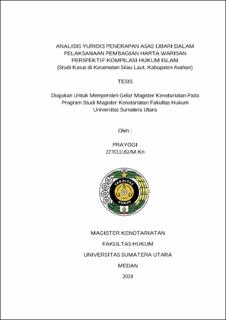| dc.contributor.advisor | Thaib, Zamakhsyari Bin Hasballah | |
| dc.contributor.advisor | Harahap, Muhammad Yadi | |
| dc.contributor.advisor | Barus, Utary Maharany | |
| dc.contributor.author | Prayogi, Prayogi | |
| dc.date.accessioned | 2025-02-10T03:05:36Z | |
| dc.date.available | 2025-02-10T03:05:36Z | |
| dc.date.issued | 2024 | |
| dc.identifier.uri | https://repositori.usu.ac.id/handle/123456789/101011 | |
| dc.description.abstract | Distribution of inherited assets can only be done after the heir is declared passed away. One of the basic principles of dividing inheritance according to Islamics law is the principle of ijbari. The principle of ijbari implies coercion, in this case, it is mandatory to distribute inheritance assets againts one’s own will in terms of inheritance law, namely the transfer of assets frim the heir to the heirs automatically without any new legal action. Formulation of the problem in this research: What is the view of the Compilation of Islamic Law on the principle of ijbari in the distribution of inheritance. What is the implementation of the ijbari principle in dividing inheritance in Silau Laut Subdistrict, Asahan Regency. What are the legal consequences of not implementing the distribution of inheritance assets in accordance with the principle of ijbari in Silau Laut Subdistrict, Asahan Regency.
This is an empirical juridical research where the data sources are obtained from primary data and secondary data consisting of legal materials, namely: primary legal materials, secondary legal materials and tertiary legal materials. Data collection is carried out tharough literature studies and field studies by conducting interviews and questionnaires with respondents. A qualitative data analysis is employed as the data analysis.
The research results of the views of the Compilation of Islamic Law on the principle of ijbari in the distribution of inheritance are contained in the Compilation of Islamic Law in Article 175 paragraph (1) letter d and Article 187 paragraph (2) which is provision that must be accepted by the heirs. Even though words of the principle of ijbari are not clearly stated, they have the same meaning, namely of obligation in dividing inherited assets among the rightful heirs. The application of the ijbari principle in the distribution of inheritance in Silau Laut Subdistrict, Asahan Regency is not carried out according to Islamic Law. This is due to children’s compliance with parents’ rules by not dividing inheritance. If so, then this is not justified. The reason for postponing the distribution of inheritance must be in accordance with al-mashlahah dharuriyah justified by Islamic law. The legal consequences of not implementing the division of inheritance in accordance with the principle of ijbari in Silau Laut Subdistrict, Asahan Regency are first, it has the potential to reduce the value or the number of shares of inheritance that does not correspond to the amount that should be obtained by the heirs; and second, there is the potential for disputes to arise among the heirs due to delays in dividing inherited assets | en_US |
| dc.language.iso | id | en_US |
| dc.publisher | Universitas Sumatera Utara | en_US |
| dc.subject | The principle of Ijbari | en_US |
| dc.subject | Inheritance | en_US |
| dc.subject | Compilation of Islamic Law | en_US |
| dc.title | Analisis Yuridis Penerapan Asas Ijbari dalam Pelaksanaan Pembagian Harta Warisan Perspektif Kompilasi Hukum Islam (Studi Kasus di Kecamatan Silau Laut, Kabupaten Asahan) | en_US |
| dc.title.alternative | Juridical Analysis of The Application of The Ijbari Principle Inthe Implementation of The Inheritance Distribution From The Perspective of The Compilation of Islamic Law (A Case Study in Silau Laut, Asahan Regency) | en_US |
| dc.type | Thesis | en_US |
| dc.identifier.nim | NIM227011162 | |
| dc.identifier.nidn | NIDN0014017501 | |
| dc.identifier.kodeprodi | KODEPRODI74102#Kenotariatan | |
| dc.description.pages | 139 Pages | en_US |
| dc.description.type | Tesis Magister | en_US |
| dc.subject.sdgs | SDGs 16. Peace, Justice And Strong Institutions | en_US |


